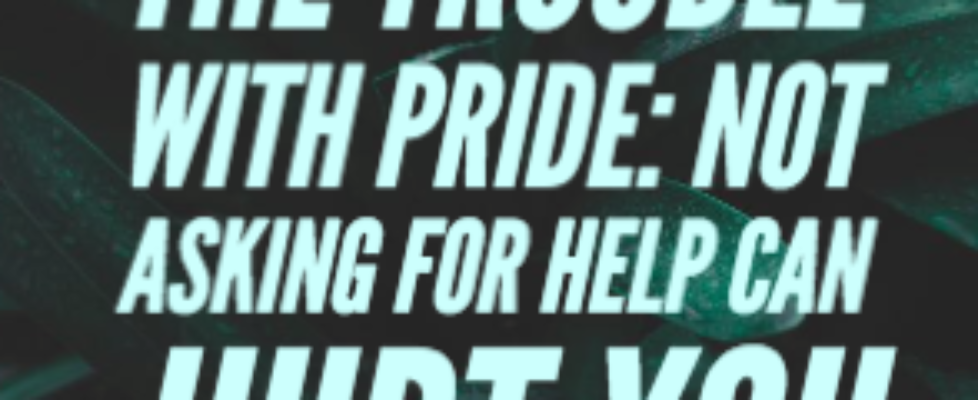The Trouble with Pride: Not Asking for Help Can Hurt You
The Trouble with Pride: Not Asking for Help Can Hurt You
By Christina Baldwin, ISR Board Member
She was 99-years old, living independently, proudly self-sufficient. So, when her window blinds needed dusting, she got on a step stool to do them herself. Something happened: she lost her balance, the steps went out from under her, she flailed for a handhold, and the blinds fell with her, the metal slats and the stool step hit her at the base of the spine. It took her an hour to slide herself across the room to the phone, pull it by the cord off the table and into her hands. Then, she called for help. Not 9-1-1, but her 97-year old friend who came right over, assessed the situation and convinced her medical treatment was needed.
“Oh, the poor dear,” you may say, “Why do “old people” do these things?” Well, it’s not about them, at least not only them. It’s all of us. We push our edges, striving to maintain the sense of selfhood we had in earlier years. Our bodies remember childhoods when every year we got bigger and stronger, noticing with pride our increased athleticism, intelligence, and problem-solving (well maybe not so much in the teen years, but returning in our twenties). If we fell, we got up. Throughout adulthood, if we got an injury or illness, we tended to recover and to benefit from physical therapy and retraining. Look at all those athletes who return to the field and push through pain while spectators cheer. Look at all those rightfully proud cancer survivors. Go into the Athletic Club, the sports gyms, the boxing gym, and there we are aging, greying, still working it, wanting to stay strong, independent, and self-sufficient.
Yes—and—the following is a “disguised-identity” list of real-life examples of pride going before a fall:
- Eighty-something years old, up on a two-story slanted roof: he fell through the skylight into the living room, much to his wife’s surprise. Broken rib. Back up there the following week to oversee installment of the replacement window.
- On a ladder changing bulbs on motion-detector lights over the patio, she slipped: two broken ankles, wheel-chair bound for months, still trying to regain former strength and sure-footedness.
- Rented a chain saw to cut up storm debris, hadn’t run one in decades, but thought he could remember; lost control of it and sawed through his wheelbarrow handles before hitting the safety switch—torn up work boots and pride—thankfully still has ten toes.
- She wanted one more dog in her life. When her kids talked her out of an 85-pound lab, she got a chihuahua mix, but with macular degeneration, she tripped over it and broke her arm.
- Her walker was only six feet from the dining table. Surely, she could walk that far unassisted: down she went, fractured pelvis.
- Signed up for a walking tour of England’s Lake District, did minimal training because she’d always been a hiker. Her feet gave out on the third day, and she spent her holiday riding with the tour organizers motoring down the highway, missing the byways she’d longed to see.
- I was changing the bed linens, sheets draped onto the floor, the phone rang… I only have a few rug burns, but injured pride and a renewed appreciation for how fast the shift from vertical to horizontal can be.
We are smart people. We are accustomed to living our lives the ways we remember them from the prime years of physical and mental fitness. I thought I was middle-aged until I was sixty and someone pointed that would require me living to 120. Okay, maybe I’m older than I think. We need to assess the years behind us and where we are now. Independence is a spectrum of reality checks.
To counterbalance my assumptions about life-as-it-was, I have developed a new practice I call, “Hold everything!” I stop for at least a Five Second Reality Check and ask myself: “Do I have the physical capacity to … (run upstairs, get on the ladder, handle this equipment, etc.?) How can I make the action safer for myself? Where is the extra hand-hold, the railing, the call for someone to hold the bottom of the ladder, or, if they are more able, to do it instead? If it’s not safe anymore, what will I do? Who can help me?”
Help is all around us. Most people enjoy being asked to assist. The underlying question is: do we ask for help before, or after, we get hurt?
My 8-year old granddaughter wants reassurance that I’m not going to die soon. “Doing my best,” I tell her. Doing my best means slowing down, taking what I call my five seconds, and asking for what I need, so that I am alive to keep offering what I can.

